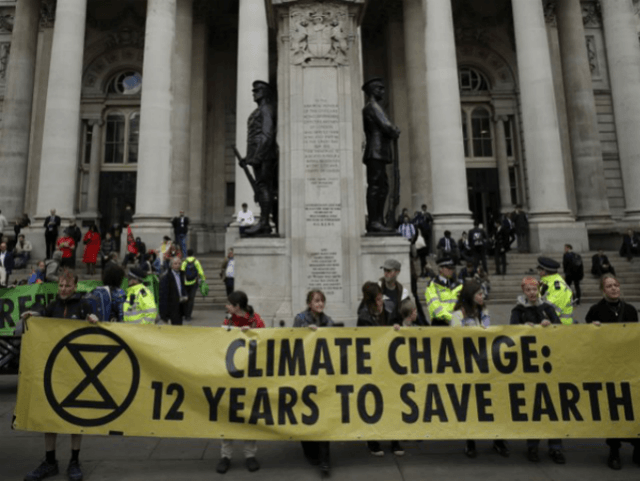One week ahead of its next climate change summit in Spain, the United Nations (U.N.) has issued a scathing report on how G20 countries are doing too little to stop “man-made climate change,” and millions of people’s fates hang in the balance.
Aljazeera wrote about the Emissions Gap Report 2019, which said the planet would face “catastrophic climate changes if emissions are not cut by 55 percent by 2030 — a date that fits the globalist organization’s 12 years until doomsday narrative:
The rise of just half a degree in global temperatures means the disappearance of entire ecosystems upon which the survival of half a billion people on the planet depends. A rise of 1.5C puts one million of the world’s 7.6 million species at risk of extinction, and will kill off 75 percent of the world’s coral reefs. A rise of 2C will kill all the world’s coral, cause massive habitats and many insects to disappear, along with shorter rainy seasons, impacting harvests.
The report said the United States and China as the worst offenders but also said Russia and the European Union are not acting aggressively to cut emissions.
“G20 countries are collectively responsible for 78 percent of all emissions, but they are not doing enough to contain global warming within the 1.5-2 degrees Celsius temperature goals established by the Paris Agreement in 2016,” Aljazeera reported.
“Emissions need to go down by 55 percent by 2030,” John Christensen, colead author of the report, said. “There is no way we are going to make it if we don’t step up action as of next year with ambitious plans.”
“Our collective failure to act early and hard on climate change means we now must deliver deep cuts to emissions, over 7 percent each year,” Inger Andersen, the U.N. Environment Program’s executive director, said in the Aljazeera report.
The article said:
Limiting warming to 1.5C is possible, says the report, but doing so requires radical changes in our economic systems as well as in our social habits. The solutions proposed by the report depict a new world that would have to be transformed within just one generation for a reversal of the climate crisis.
“It will take political will, yes, but the science says we can,” Anderson said. “Failure is not an option.”
“We need quick wins to reduce emissions as much as possible in 2020,” Anderson said. “Then we need stronger Nationally Determined Contributions (NDC) to kick start the major transformations of economies and societies.”
Aljazeera reported that the price tag for the “transition” to becoming eco-friendly would be between $1.6 to $3.8 trillion a year from 2020 to 2050 (a date that is significantly later than the 12 year doomsday scenario).
And it would require “developing economic and social policies that encourage materials efficiency, low waste and consumption, reuse and recycling should become a top priority, along with preserving the existing forests and planting new ones.”
But the report has competition from other data on the environment that show the United States had the greatest reduction of emissions of any country in the world in 2017.
“In 2017, US had largest decline in CO2 emissions in the world for 9th time this century,” the American Enterprise Institute reported using data from the June 2018 BP Statistical Review of Global Energy.
The other nine of the ten countries logging reductions were, in descending order: Ukraine, Mexico, United Kingdom, South Africa, Venezuela, Columbia, United Arab Emirates, Turkmenistan, and Japan.
The countries with the greatest increases in emissions, according to the report and listed from one through ten, are South Korea, Russia, Canada, Spain, Indonesia, Iran, European Union, Turkey, India, and China.
Follow Penny Starr on Twitter

COMMENTS
Please let us know if you're having issues with commenting.